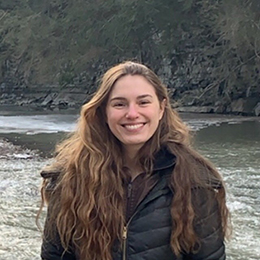
Izabella Kornak, Muth Lab (Class of 2019)
BS Candidate, Environmental Engineering, Cornell University
ePortfolio Posts
Private: Tidy Data Izabella Kornak
Private: Final BUEE Poster Izabella Kornak
Private: BUEE Presentation June
https://docs.google.com/presentation/d/1FhHcs9UQ4E3ebV87DksDZ5nzuRuES-LSFkmPl22Wb2Q/edit?usp=sharing
Private: Research Abstract and Experimental Procedures Project Proposal
Urban aquatic environments often face unique challenges due to heavy wastewater, industrial, and storm water discharges. The eutrophic and toxic conditions present in urban waters can lead to human and animal health hazards if not treated. This study will test the phytoremediation capabilities of sterile duckweed and duckweed with an environmentally acclimated microbiome on polluted urban waters. We hypothesize that duckweed, coupled with the bacterial community it harbors, can effectively uptake phosphorus, nitrogen, and other contaminants when introduced to polluted waters. The phytoremediation capabilities are also thought to be enhanced with regular harvesting and re-seeding. Water samples collected from Prospect Park lake, and changes in contaminant levels will be tested using sterile duckweed, Prospect Park duckweed, and no duckweed application. The effects of regular harvesting and re-application will also be observed in reference to no harvesting throughout the experiment.
It is important to identify potential applications for duckweed post- phytoremediation in order to minimize waste and achieve a sustainable system of water purification. Duckweed has been used as a fertilizer for agricultural application, due to its potential for accumulating essential plant growth nutrients from polluted waters, such as phosphorus and nitrogen. We expect that duckweed used in phytoremediation of polluted urban waters could potentially be used as a fertilizer. We will test the effects of sterile duckweed, post process duckweed, and no fertilizer on beefsteak tomato plants. Plant growth, health, and height will be regularly measured throughout a six-week growing period, where fertilizer was applied weekly.